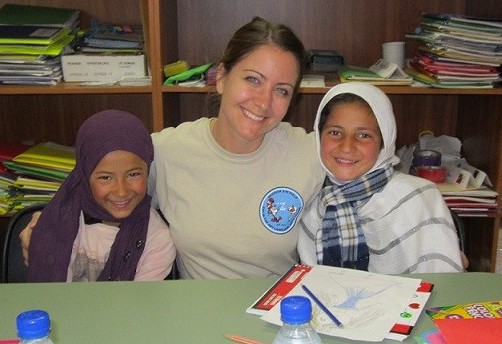George Mason University doctoral students LeNaya Crandall Hezel and Lt. Col. Michelle Ruehl are being recognized for their service work and desire to make an impact. The two are part of the 2021 class of Tillman Scholars, named in honor of Pat Tillman, the former NFL star who was killed in Afghanistan in 2004 while serving with the U.S. Army Rangers.
Hezel is a military spouse and diversity, equity and inclusion (DEI) consultant working on a PhD in sociology, and Ruehl is an Air Force pilot and English teacher working on a PhD in Writing and Rhetoric. The women are two are the 60 scholars chosen from thousands of applicants this year by the Chicago-based Pat Tillman Foundation.

LeNaya Crandall Hezel
A classically trained soprano, Hezel is now using her voice to advocate for DEI. During the tumultuous 2020, she started NayceQuest LLC to guide organizations as they discover meaningful ways to be equitable and inclusive.
She said that when the COVID-19 pandemic hit, her husband, who serves in the U.S. Navy, had just returned from a deployment in Djibouti, and at home with her three daughters, she was thinking “How are we going to do this?” She made the decision to step away from her full-time job as the inaugural veterans office director at Georgetown University and be a full-time student.
“Then George Floyd’s death happened, and I couldn't sit on the sidelines and be like, ‘I'm just going to let the rest of the world figure it out,’” said Hezel, who is also a 2021 Stand-To Veterans Leadership Program Scholar with the Bush Institute. “When I recognized where the need and the demands for this work were, I took action.”
Growing up, Hezel had two nicknames, Nay and Ace, which she merged into Nayce for the name of her company. Through NayceQuest LLC, she has been helping organizations move beyond “checking the box” when it comes to implementing DEI in the workplace. For this work Hezel said she is using a sociology lens and institutional ethnography, looking at the differences between “what's being said versus what is actually happening in the day-to-day practices.”
With her dissertation, Hezel again puts the need of veterans and her previous work with the veterans and military community at the forefront as she looks at campus veteran resource centers and whether they have an impact on student academic success, specifically undergraduate student veteran graduation rates.
“My hypothesis is the schools that have the resource center or the dedicated office, they're going to have higher graduation rates,” said Hezel. “But there's no research on that so I hope to fill that gap.”

Lt. Col. Michelle Ruehl
Things move fast in Ruehl’s world, and not just because she is an Air Force pilot. She started her doctoral studies at Mason in 2021 after a year as a White House Fellow where she worked as a speech writer for a number of leaders, including Vice President Kamala Harris.
When she found out her next assignment would be at the Pentagon, working with the Joint Chiefs of Staff for three years, she quickly scrambled to get herself in a PhD program. Ruehl has been teaching English and aviation at the Air Force Academy with two master’s degrees, one in English and another in psychology.
“I've taught now in higher ed for eight years, and I would love to keep doing that,” Ruehl said of adding a PhD to her list of credentials. “[The academy] doesn't require pilots to have a PhD, and I realized, when I get out of the Air Force, I will actually have to compete for jobs with the real professors.”
Even before the Air Force Academy gig, Ruehl was finding her way into the classroom. She tells of flying planes over Afghanistan at night and volunteering to teach English during the day.
As the daughter of a musician and the granddaughter of a choir director, she said she also finds teaching English to be an excuse for bringing in other parts of the humanities, including music. Music really made a difference in one of those Afghanistan classrooms in which she was teaching a group of men.
“They want to learn English so badly that they were willing to kind of put up with me,” said the mother of two. “But they wouldn't look at me.”
To break the ice, she brought her guitar to class and sang a song in Dari that she learned online. “Of course, I was butchering it,” she said of the song.
But soon the students were laughing and asking her where she learned the song—and if she could play Michael Jackson.
“Music was able to break down 3,000 years of cultural differences,” she said. “It took a couple of weeks, but then we could get to the writing.”
After her last deployment, Ruehl and her husband started the nonprofit Parwana LEADership Legacy to honor the friends they lost in the war and the people of Afghanistan. They provide leadership programs to veterans and their families.
She also created a camp curriculum for kids that teaches empathy, active listening and service, often using horses. Each camp session is dedicated to a service member who was lost in Iraq or Afghanistan.
“It felt like the only thing I could do when I came back from my deployment was to find a way to keep saying their names,” she said.
